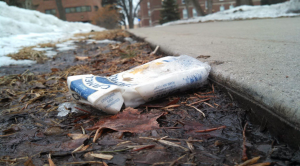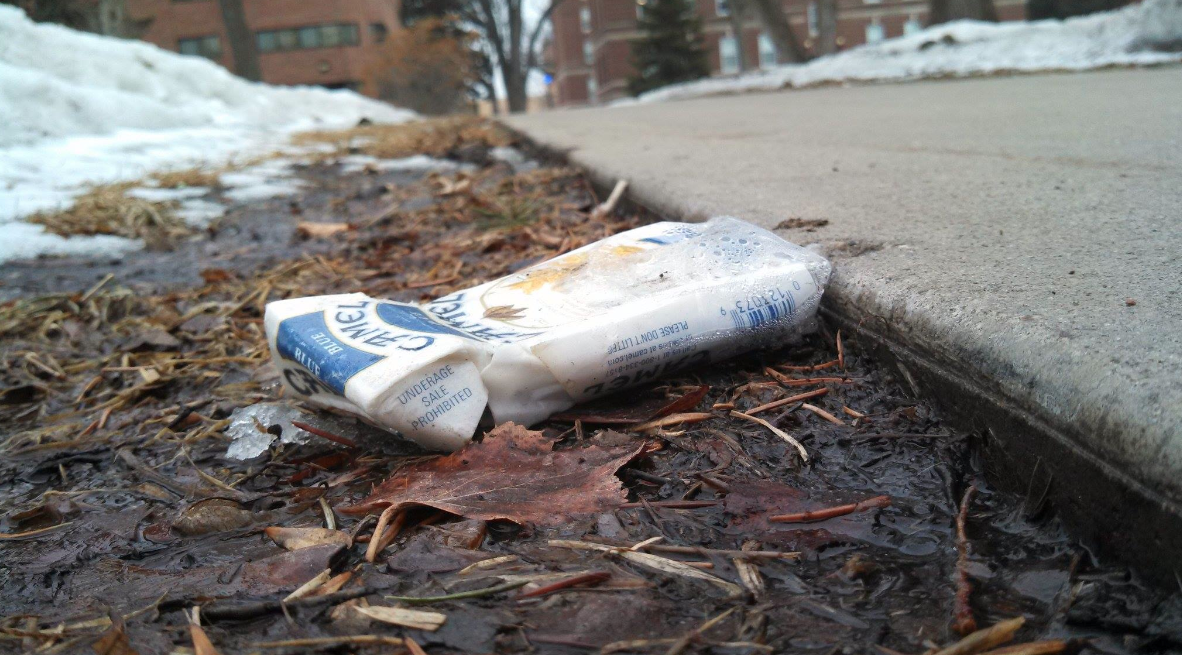Warmer temperatures are revealing that the community-enforced tobacco ban at St. Thomas may not be completely effective yet.
The ban began in freezing weather on Jan. 1, and while some St. Thomas students said they’ve noticed a drop in the number of smokers, others said the ban is ineffective because of a lack of enforcement.
“I just think that it’s not enforced,” sophomore Daniel Herriges said. “While there are signs and things up around campus, I think that people are still going to want that cigarette after class.”

Community enforcement relies on individuals going up to campus smokers, informing them of the ban and asking them to put out the cigarette. Sophomore Cassidy Hanzlik said while the ban may look good on paper, the method isn’t proving effective.
“I think that people think it’s rude to go up to someone and say ‘Hey, there’s no smoking here,’” Hanzlik said. “People don’t want to start that. They just keep walking.”
Both Hanzlik and Herriges have never seen anyone confront a smoker.
“Although it is kind of nice that you can step outside and get a breath of fresh air without getting second-hand smoke, it doesn’t really bother me,” Hanzlik said. “I think the people who have a huge issue with it are going to be the ones going up and doing it. It’s community based, and everyone has their different level of how much they care about it.”
Social psychology professor Ryan Bremner said that there are many reasons why students do not want to confront someone.
“In general, people are reluctant to approach somebody and tell them something they’re doing is wrong,” Bremner said. “There’s a strong social taboo against going up and telling people they’re doing something wrong.”
Usually restricted to close friends, Bremner said this direct confrontation is avoided because it almost inevitably results in negative feelings or actions and is unpleasant for the confronter.
“I could see some people getting really annoyed that their peers are coming up to them and telling them what to do,” Bremner said. “It would depend on the individual who is smoking.”
Undergraduate Student Government president Jenna Johnson said she thinks the problem is a lack of awareness, rather than student enforcement.
“There’s always a learning curve,” Johnson said. “I think as it becomes more known that the St. Thomas campus is smoke-free, students will start abiding by our policy. There are signs posted about our tobacco free policy, but I think there are a lot of students who don’t know about it yet.”
Johnson said that increased awareness will lead to a more effective ban over time.
However, Herriges said that in order for the ban to become more effective, there needs to be further enforcement from the school.
“There would have to start be ticketing by Public Safety or have them write people’s names down,” Herriges said. “Whether I’m for that or against that, I could care less.”
Johnson said she thinks this might not be the best method.
“I personally wouldn’t suggest that,” Johnson said. “I wouldn’t want students to get a fine for smoking on campus. Maybe having Public Safety politely ask them to leave the campus when they’re smoking, but a fine is not something I foresee them doing in the future.”
Bremner said that he’s never heard of this kind of enforcement.
“Usually, if there’s some sort of ban on any type of public behavior, then there’s a designated group of people who are responsible for the enforcement of it,” Bremner said.
The ban is still community-enforced, and according to Johnson, there are no current plans for further enforcement.
“It’s America,” Herriges said. “You can smoke a cigarette if you want, but I think that in order for it to be officially made a campus free of tobacco, you would need to do further enforcement with police or Public Safety.”
Simeon Lancaster can be reached at lanc4637@stthomas.edu.


This article just shows how ridiculous the ban is. The smokers ive talked to have all begun to smoke on campus again, after learning of the details of the ban. It’s not a lack of education, it’s education that is leading to the ban not working. Because it’s nonsensical to have a ban that carries no penalty and is enforced by people without any sort of authority.
This article lacks focus and is without a strong thesis or conclusion. Why are the same exact quotes written twice? The author should have provided more concrete solutions to this “problem” rather than just stating people’s opinions. It should be presented as a public health issue rather than just a “campus rule”.